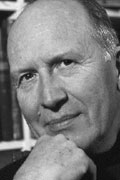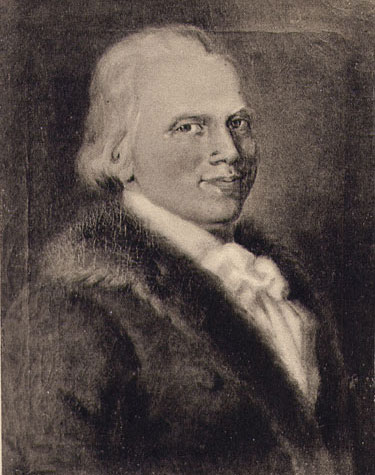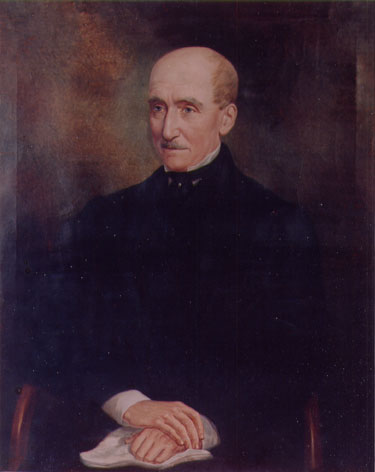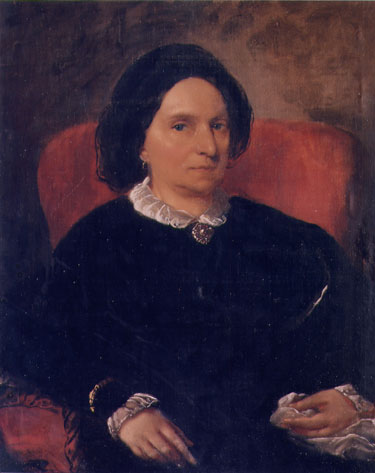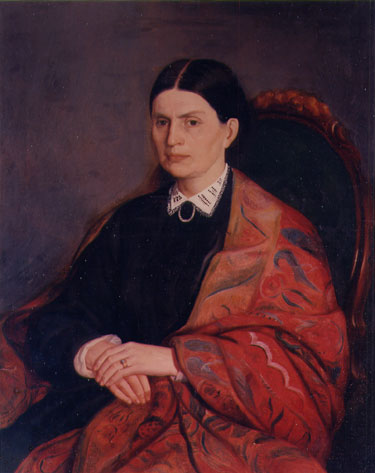The history of the intertwined Whittall/Giraud families has been well documented over the years in numerous articles, books, and family member recollections. The purpose of these reflections is not to repeat what has already been said, but to try and analyze some of the events in that history which made it turn out the way it did. The views expressed here are strictly the writer’s.
THE FOUNDERS
Jean-Baptiste Giraud |
Charlton Whittall |
Jean-Baptiste Giraud, born in Antibes, France in 1742, was the first Giraud to settle in Smyrna. It has sometimes been stated that he left France “to escape the terrors of the revolution”, but that is not the case, as he arrived in Smyrna around 1765-66, more than 20 years before. He set himself up in business in the import/export trade, a successful endeavour which made him quite wealthy. Jean- Baptiste took a while to get married, but he finally did so and had three children in quick succession when approaching his fifties: Alexandre (born 1789), Magdelaine (1790), and Frédéric (1792). Those years coincided with an event that caused him the first major shock of his life, and extreme distress: the French Revolution, the violence of which (especially the execution by guillotine of the king and his family) made him wish to renounce his French citizenship and acquire the Austrian one, as seen by the copy of a manuscript letter addressed to Emperor Francis II of Austria.
(We must thank Frederick de Cramer, of Izmir, for this manuscript letter, which he coincidentally unearthed when researching the origins of his family in the Vienna, Austria, archives).
An English translation of the letter follows:
Jean Baptiste Giraud born at Antibes, in Provence, of a bourgeois family allied to the nobility and honoured in its country, a family who for two centuries had occupied some of the highest positions in that city, his father being the mayor when he died at his post in 1788. He himself settled in the Levant more than 30 years ago, devoting himself to the business of merchant trade in Smyrna, where he managed a French establishment known for the scope of its activities and for its high principles. He had acquired an honest fortune, had married a daughter of the former Consul of Venice Mr. Cortazzi, a member of ancient nobility, and had had two boys and one girl, the objects of his love and hopes. His design had been to repatriate himself to France in order to complete the education of his children, -when the horrible revolution occurred, filling the country with crime and murder, and resulting in the assassination of the best of Kings, his august wife, his sister, and his son, which put a stop to his project.
The persecutions carried out by these criminals who seized power, against those who, far from approving such actions, have suffered from them; the means used, as far away as the Levant, to destroy the property and assets of French citizens: all of this has caused Jean-Baptiste Giraud to repudiate this guilty homeland, to refuse to step again onto a soil drenched in innocent blood, that of his relatives and his friends, and to distance himself from a Republican Government, he who had been born under the reign of the best of Kings, to whom he had sworn love and obedience in his heart.
It was in 1793 that the supplicant applied to His Excellency Baron Herbert Rathkaal, Internunzio of Your Imperial Majesty at the Porte, in order to request your eminent protection, sending him his oath of loyalty towards your august person, and his unassailable commitment to the Roman Catholic and Apostolic Religion, which he practices. The prospect of becoming a permanent subject of Your Majesty, a Magnanimous Sovereign so great in the war which he is conducting in such a glorious manner against a guilty people, or against the criminals who have misled it, had always filled the supplicant with hope. This is when Baron Herbert Rathkaal, Your Majesty's Minister in Constantinople, convinced of the supplicant's high principles, kindly appointed him, in May 1795, to be Vice Consul of Your Imperial and Royal Majesty in Smyrna, and entrusted him with the protection of all Imperial and Tuscan subjects in this Turkish City.
Basking in the glory of serving a Sovereign chosen willingly and spontaneouly, so worthy of one's love and respect, his zeal has known no bounds. He has worked tirelessly in the important and numerous tasks entrusted to him, being fully accountable to his Minister in Constantinople. Receiving no remuneration, and no compensation for loss of business, he has maintained the honour of his posting at his own expense, which has cost him more than 2000 Piastres per year to pay for janissaries and dragomans, to establish a chancery, and to meet other expenses in the service of his adoptive new homeland. His business as a merchant has been neglected due to the time spent managing the Vice Consulate, to which he is dedicated.
The supplicant was informed today that Mr. Cramer will be arriving in Constantinople, and that, as he has been appointed Consul General in Smyrna by Your Majesty, he will be replacing him in his duties.
The supplicant considers himself fortunate to have been able to serve Your Majesty's Smyrna subjects in an honourable and useful manner, and to have been worthy of approval and praise from Your Minister in Constantinople, Baron d'Herbert, whom he beseechingly calls to bear witness, and requests his support before your Sacred Person. He has but one favour to solicit from Your benevolence, and that is to obtain a certificate, or letters, of naturalization, for himself and all of his family, signed by Your August hand, whereby he is declared to be your faithful subject. He wishes to die as such, and would be in despair should he not be recognized as having this status by Your officials and Consuls in the Levant. He also requests this aegis in order to be protected from any present or future persecutions by the French republicans, who at any time may resume their investigations in Turkey. All the more reason for this is that the Republican Constitution does not allow any person to regain French citizenship, who has been employed as a public servant of a Foreign Power, at war with France, even if that person wishes to do so (a wish that is very far from the supplicant's heart).
The hope which Jean-Baptiste Giraud has to obtain the favour which he solicits from Your Majesty is based on justice. It will enable him, in due course, to move his assets and his family to the Hereditary States of Austria, and he will not cease to pray for and wish long life to the Great Sovereign who governs them, as well as all his family, which he shall always be ready to serve anytime and anywhere.
It is with these feelings, and with my deepest respect, that I am,
of Your Majesty
The most humble and very obedient subject.
at Smyna, the 2nd August 1796
Signed: J. B. Giraud
Translated from the French by J.P. Giraud
It is not known whether the Austrian Emperor replied to that letter, or granted Jean- Baptiste his request, but the fact of the matter is that he remained a French citizen until his death in January 1811, which was recorded at the French Consulate General in Smyrna. By 1799, 3 years after that letter, Napoleon Bonaparte had seized power in France, installing himself as First Consul, and had then crowned himself as Emperor 5 years later, in 1804. Jean-Baptiste, who had always been a royalist, was probably not too unhappy to see the cursed “republicans” replaced by a “sovereign”, albeit an upstart one. And it did not hurt that the Girauds in France were extremely close (even related perhaps) to the Massena family, a member of which was one of Napoleon’s prominent marshals. In any event, Jean-Baptiste sent his eldest son Alexandre to France in 1802 to complete his education. He returned to Smyrna in 1805.
The second major shock in Jean-Baptiste’s life was literally a death blow, which had dire consequences for the future of the family. It occurred in late 1805, when two of the cargo ships he had chartered were captured and impounded by the British Navy (the war between Britain and France was raging at the time: that was the year of the battle of Trafalgar). It is said that he lost two million francs, meaning all of the fortune he had amassed over the previous 40 years. What remained was the main house in Smyrna’s Frank Street (called “Frankhané”), three houses that he owned in Bournabat (Bornova), and very little cash. His wife Hélène managed to hang on to her jewelry, but it appears his son Alexandre had to sell his horse. Thus from 1806 onwards the Girauds, from being wealthy, became a family of modest means, and this remained so for a hundred years.
Charlton Whittall, born in Liverpool, England in 1791, was the first Whittall to settle in Smyrna. He arrived there in 1809, at the young age of 18, to be the representative of an English firm of merchants, with a contract that also allowed him to trade for his own account. This he promptly proceeded to do, and as he was a very enterprising and business savvy person, he became quite adept at it, setting-up his own trading firm, C. Whittall & Co., in 1811. Success followed.
Whether Charlton Whittall ever met or knew Jean-Baptiste Giraud has not been documented but is doubtful, in the opinion of this writer, as the two families must have been navigating in two different social circles, one British and Protestant, the other French and Catholic (Smyrna’s cosmopolitan and multicultural character only developed much later). What is known, however, is that Charlton decided to move his living quarters from epidemic-prone, narrow-streeted Smyrna to green, healthier Bournabat (Bornova), and that in 1811 he rented one of Jean-Baptiste Giraud’s Bournabat houses from his widow Hélène who, as previously mentioned, had three children: Alexandre, Magdelaine, and Frédéric, all of Charlton’s age (their early twenties). This was a fateful event in the Giraud/Whittall history.
THE MOTHERS
Magdelaine V.B. Whittall (nee Giraud) |
Magdalene B. Whittall (nee Giraud) |
In 1814, three years after moving to Bournabat, Charlton married his landlady’s daughter Magdelaine Giraud. This marriage was the initial knot tying the two families, and Magdelaine became the first of the Giraud mothers. The match was probably not one of equals: Magdelaine was poor, Charlton an up-and-coming businessman. The children (eight of them) were all given English names (Charlton Arthur, James, etc.), and were brought up speaking English rather than French. Four of the five boys were sent to England at a young age for their education, and all the children were raised in their father’s Protestant, rather than their mother’s Catholic, faith.
Charlton and Magdelaine’s third son James was born in 1819. He was one of the boys sent to England to be educated, and in due course he joined his father at C. Whittall & Co., where he eventually became the principal partner. On the 27th August 1838, when he was 19 years old, he married Magdalene Giraud, the daughter of his mother’s elder brother Alexandre Giraud, and therefore his first cousin. Thus the two families became even more intertwined.
A copy of the marriage record (appearing in the Smyrna Anglican Chaplaincy Registers) is shown here:
Magdalene Giraud, born in 1823, was 15 years old when she married James Whittall, and she was also 6 months with child (her first born James William, later Sir William, was born 1st December 1838). Whether this caused a mini-scandal in Bournabat has not been documented, but in any event, Magdalene proved to be a prolific second Giraud mother, as 12 more children were born over the next 26 years, until she was 41. All were raised speaking English and in the Protestant faith.
A WHITTALL CENTURY
For most of the 19th century the Whittall family dominated the British business and social scenes in Smyna and Bournabat. This was accomplished through business success, and also by sheer numbers: James and Magdalene had 91 grandchildren and 256 great-grandchildren; James’s elder brother Charlton Arthur had 11 children, most of them having issue, while another Charlton (of “the Charltons”), had 12 children...
Here, then, were two Giraud girls running Whittall homes and raising Whittall children, but although it was very much a man’s world at that time, the Giraud men do not seem to have had much influence during that period. They all remained the “poor relatives”, often employees of the Whittall family.
-Alexandre, Jean-Baptiste Giraud’s first son (Charlton Whittall’s brother-in-law, Magdalene’s father), did not accomplish much during his lifetime. His date of death is undocumented, but he must have passed at a relatively young age, as his widow remarried and had 4 children with her second husband. Alexandre had a difficult life financially, and in 1823 sold his one-third share in the Frankhané, inherited from his father, to Charlton Whittall (in 1819 he had already sold to Charlton Whittall his inherited share of the Bournabat house which Charlton was renting).
-Frédéric, Jean-Baptiste Giraud’s second son, worked as an agent for C. Whittall & Co. in the town of Tchesmé (Çesme). He also sold his share of the Bournabat house to Charlton Whittall. Frédéric died in 1837, at the young age of 45. It is from him that the future generations of Girauds are descended, so he holds a special place in this history.
-Lt. Colonel Jean-Baptiste Giraud, was Frédéric’s son. He lived a rather colourful life, joining the British army during the Crimean War, where he obtained the rank of lieutenant-colonel. He became a British subject, and thus began the “anglicization” of the Giraud family. (His children, however, retained their French nationality). He married Anne-Marie de Hochepied, a Huguenot Dutch protestant, and their children were raised in the protestant faith. Thus also began the “protestantization” (if one may use the word) of the Girauds. Lt. Col. Jean-Baptiste Giraud did not interact to any noticeable degree with the Whittall family.
-Jacques Joseph Frédéric (1837-1922), aka Frederic or “Fred”, was Lt. Col. Jean-Baptiste’s eldest son. He becomes very relevant to our history as he married his second cousin Mary Whittall, daughter of James and Magdalene, making the knot between the two families even tighter. For the greater part of his life, Frederic was an employee of C. Whittall & Co.
TURNAROUND
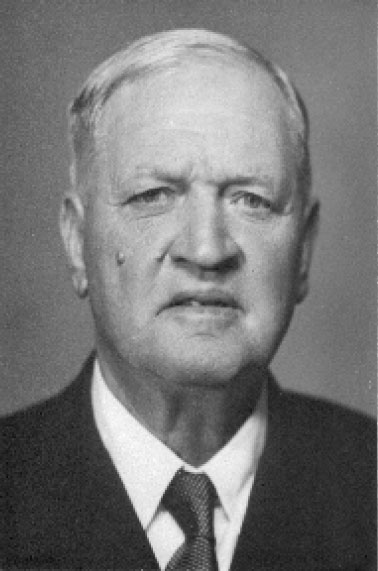 |
Harold Frédéric Giraud (1872-1963), aka “Harry”, was the third son of Frederic and Mary Giraud (Whittall). Mary was a rather stern mother. She was also very British: both her own mother - Magdalene - and her husband were French, yet her five sons, whose births were registered at the French Consulate in Smyrna, were all given English first names, and they were not allowed to speak French at home. Anyone of them caught speaking French in her presence was roundly slapped. As a consequence, the boys never learned to speak French properly.
Harry had four brothers: the eldest, Charlton (born 1869), at a young age started work as an employee of C. Whittall & Co., following in his father Frederic’s footsteps; Edgar (1871), was the artist of the family, and became a concert pianist; Edmund (1880) and Jim (1882) also initially spent some time working in the Whittall company. As for Harry himself, he was employed as a young man in one of the La Fontaine companies (the La Fontaines were another prominent Smyrna British family related by marriage to the Whittalls).
Around the year 1900 Harry had the good fortune of meeting Joe Armitage Sykes [family album], an English engineer who had recently arrived in Smyrna. Together, in 1902, they set up a wool spinning mill and chemical dye plant, and started successfully promoting the use of machine-spun and chemically dyed wool yarns in the manufacture of oriental carpets. This was the technique of the future (until then the yarns were hand-spun and vegetable dyes were used).
Harry’s principal achievement, however - and the source of the Giraud family’s subsequent wealth - came in 1907-1908, when, seconded by Joe Sykes, he successfully orchestrated a merger among six of Smyrna’s largest carpet manufacturers.Thus in 1908, Oriental Carpet Manufacturers Ltd. (OCM) was founded. Harry took a large chunk of founders’ shares for his efforts, and joined OCM’s first board of directors. The company was listed on the London Stock Exchange with an initial capitalization of £400,000, an enormous amount for that time (approximately £20 million in today’s money) . Within four years, OCM had literally cornered the world market for oriental carpets, and had become the largest non-governmental corporation in Turkey.
In 1913, a large cotton textile mill was set-up, as well as a wool textile mill at around the same time. In 1914, a dried fruit export business (C. J. Giraud & Co) was also created and financed by Harry in the name of his brother Charlton, in which his youngest brother Jim also became a partner. (In fact, Charlton by then had become the manager of C. Whittall & Co.’s dried fruit export department; when he asked his Whittall uncles (Edward, Richard and Herbert Octavius) for a partnership and was refused, the Giraud competitor company was formed).
Harry, however, was not interested in managing the businesses on a day-to-day basis. A keen sportsman, yachtsman, tennis, golf and bridge player, he preferred spending his time monitoring them from afar while enjoying life with his many friends, mainly on his yachts. He owned three of them during his lifetime, all sailing boats: with the first one, the Reseda, he escaped from burning Smyrna in 1922 with his wife and three children and took them to Mytilene:
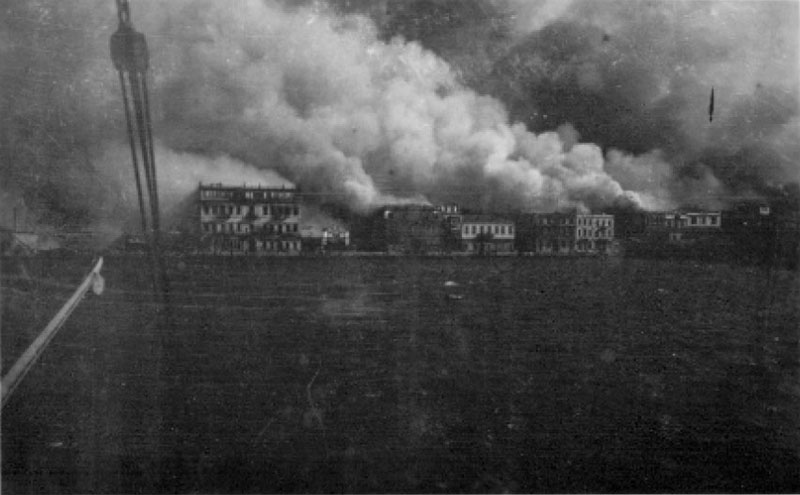 |
He purchased the third one in 1935: the 112ft. J Class Cambria, which he renamed as the Lillias:
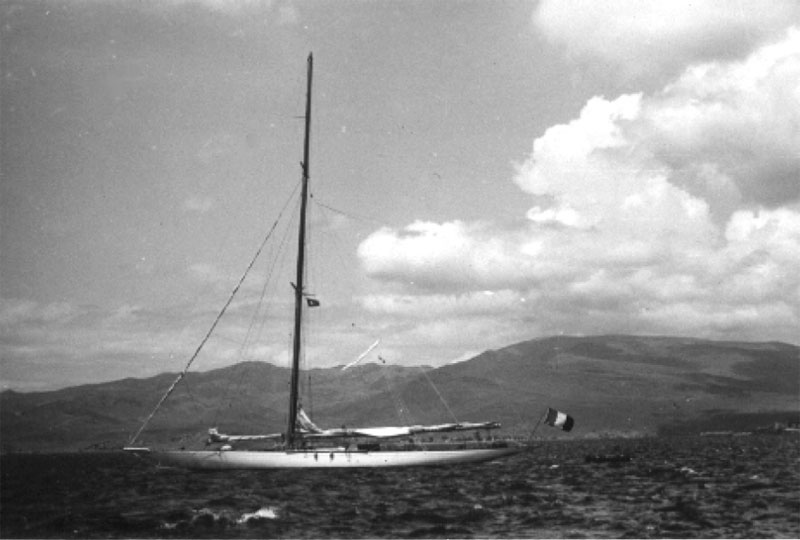 |
He got his brothers to run the businesses, and they all did very well out of this arrangement, especially Edmund.
Harry liked and trusted the Turks. He was the only member of the family in that generation to speak fluent Turkish, and had many Turkish friends, including Rahmi Bey, the then Governor of Smyrna. He was honoured by Ataturk’s visit on the Lillias in 1937.
Throughout his life, Harry was very generous and open-handed with the needy, mainly Turkish. Hundreds of Turks attended his funeral when he died at age 91 in 1963. Contrary to his brother Edmund and others, Harry did not leave any written records, books or diaries, and consequently he has stayed under the radar screen in the various family histories. However, he remains the architect of the early 20th century turnaround in the Giraud family’s fortunes.
THE GREAT WAR AND BEYOND
Soon after the textile mills were set up in 1913 they started producing for the local market. This included some contracts with the Ottoman army for the supply of cloth for its uniforms. When war was declared in November 1914 the Turkish High Command requisitioned (commandeered) some of this cloth production and the Girauds, being French nationals, had a dilemna: obey or disobey. Obeying meant that they would be able to keep control of their companies, while disobeying entailed the seizure of the factories and the probable loss of their assets. They were under duress, and obeyed.
While no British or French court has ever carried out any proceedings against the textile companies, or OCM, or any of their members for their conduct during World War I, this chain of events caused some gossip, which continues to this day, whereby the Girauds ”were the suppliers of textiles to the Turkish Army during the first world war”. Some went as far as to state that the Girauds had “traded with the enemy” during that war. On the other hand, one could point out that the Whittalls, who had received the Sultan’s visit in one of their beautiful Bournabat homes, had been recognized by the Sultan as “friends of Turkey”, not to be harmed. So Edward Whittall, for example, during the war ostentatiously flew the British flag over his house with no risk of repercussion, and continued to fraternize with the Turks.
The Girauds’ war record during 1914-18 remains unblemished. Most of the five brothers were overage to serve. Harry, the founder of those infamous textile mills, was 42 in 1914. When war broke out, he boarded a ship bound for Marseilles and volunteered for duty in the French army. He was refused and shipped back for being too old. Charlton’s son Raymond (Croix de Guerre) served; two of his other sons Noel (Croix de Guerre) and Wilfred (Médaille Militaire) both served and were killed in action.
Of course some Whittalls also served, were decorated, and gave their lives during that terrible war.
The Girauds’ star continued to rise after the war: even some of the large Whittall houses in Bornova, and some of those on the “terrace” in Ilica, ended up in Giraud hands. The 20th century became more of a “Giraud century”, but the intermingling of the two families did not persist: each one went his separate way.
Today there are very few Whittalls, if any, left in Turkey. Most of them have scattered around the globe as the years went by after 1922. Some Girauds are still there, in a limited number. All the great Whittall and Giraud companies are gone: gone OCM, the textile factories, the trading firms... Sic transit gloria mundi.
There is probably a whole history for someone else to write covering the period between the 1920’s and the present day.
Orangeville, Ontario, Canada
October, 2012
Notes: 1- To view a gallery of photos from Edmund Haydn Giraud’s album (some showing Harry Giraud and his yacht on a beach near Çeşme), click here:
2- Another example of Anglicisation of the Giraud family is seen with Eldon Giraud (1910-1996), son of Charlton James Giraud (1869-1955) and Ester Wilkinson, grandson of Frederick Jacques Giraud (1837-1922) and Mary Whittall (1843-1932) and great-grandson of Lt. Col. Jean-Baptiste Giraud. Eldon is the only one in the ‘Anglicized’ Giraud family to have actually (and legally) renounced his French citizenship & acquired the British one (another Giraud, his great-grandfather, Lt. Colonel Jean-Baptiste, had in the 1850’s merely ‘received’ British nationality by joining the British army during the Crimean War). Some telegrams sent to Eldon Giraud of Moda from family and friends in Bornova on the occassion of his second marriage (to Janine Pappa) in 1945.
